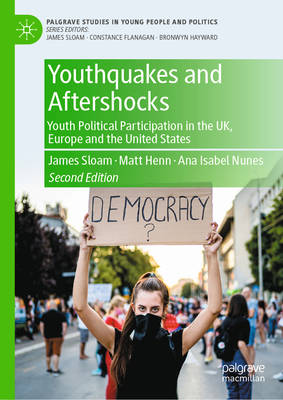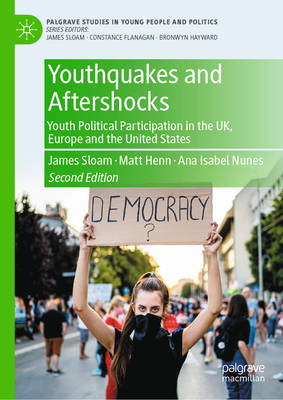
- Afhalen na 1 uur in een winkel met voorraad
- Gratis thuislevering in België vanaf € 30
- Ruim aanbod met 7 miljoen producten
- Afhalen na 1 uur in een winkel met voorraad
- Gratis thuislevering in België vanaf € 30
- Ruim aanbod met 7 miljoen producten
Zoeken
Youthquakes and Aftershocks
Youth Political Participation in the Uk, Europe and the United States
James Sloam, Matt Henn, Ana Isabel Nunes
€ 128,45
+ 256 punten
Omschrijving
This book investigates key trends in youth political participation in the UK, Europe, and the United States since the turn of the century--with a focus on the UK General Election and the US Presidential Election that were both held in 2024. It explores the reasons why many young people seem to have become disillusioned with electoral politics in the aftermath of recent youthquake elections, such as the 2017 UK General Election (with their overwhelming support for the Labour Party) and both the 2008 and 2020 US presidential elections (in support of Obama and Biden). We attribute their disenchantment to failures of public policy (that seem to increasingly favour older generations) and of communication--resulting in political parties' inabilities to effectively connect with young people on issues that they prioritise and that have meaning for their everyday lives. The book shows how this led to lower turnouts in 2024 in both the UK and the USA and highlights the very low rates of participation amongst youth from lower socio-economic groups. This is potentially dangerous for democracy; if young people continue to feel let down by parties and to abstain from voting, it is likely to lead to more reactive public policy and to increases in the attraction of populist (or extremist) parties and candidates to young people. The book emphasises the need for mainstream parties and candidates to provide a more meaningful youth offer and to mobilise young people through horizontal forms of communication. From a young person's perspective, the book also shows how (citizenship) education can play an important role in resisting populism and disinformation and in rejuvenating democracy.
Specificaties
Betrokkenen
- Auteur(s):
- Uitgeverij:
Inhoud
- Aantal bladzijden:
- 192
- Taal:
- Engels
- Reeks:
Eigenschappen
- Productcode (EAN):
- 9783032029898
- Verschijningsdatum:
- 21/01/2026
- Eerder verschenen als:
- Uitvoering:
- Hardcover
- Formaat:
- Genaaid
- Afmetingen:
- 148 mm x 210 mm
- Gewicht:
- 370 g

Alleen bij Standaard Boekhandel
+ 256 punten op je klantenkaart van Standaard Boekhandel
Beoordelingen
We publiceren alleen reviews die voldoen aan de voorwaarden voor reviews. Bekijk onze voorwaarden voor reviews.








